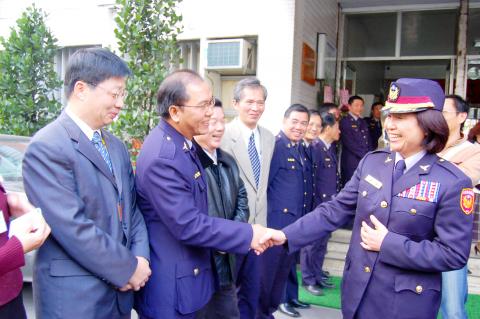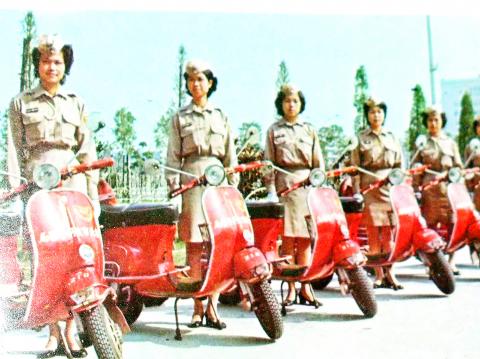March 4 to March 10
Hsieh Fen-fen (謝芬芬) almost became Taiwan’s first female police precinct head in 1998, but then-Taipei mayor Chen Shui-bian (陳水扁) changed his mind after Hsieh’s high-ranking male colleagues voiced their opposition. It didn’t matter, though, as Hsieh would earn a higher position on March 5, 2003 when she was sworn in as Taiwan’s first female police bureau chief during Chen’s first term as president. It was another “female first” on her resume — two years earlier, she made history as the first female security department chief at the Presidential Office.
In late February 2003, Hsieh was among three finalists for the Yilan County Police Bureau Chief position, which was to be decided by Yilan County Commissioner Liu Shou-cheng (劉守成). News reports speculated that the “hard working” Hsieh, who had recently joined the Democratic Progressive Party (DPP) and had the backing of the Chen administration, would get the job.

Photo: Hu Chien-sen, Taipei Times
“As long as that person is serious, proactive, displays good conduct and can work well with the county government, family background and gender should not be an issue,” Liu said three days before he picked Hsieh.
According to government statistics from last month, 10.6 percent of Taiwan’s police force were women by the end of last year. This number has jumped significantly over the past decade from 3.6 percent in 2004 — the year the Central Police University began allowing married women to apply. The goal of the policy was to get the number up to 4 percent, one that was achieved by the end of 2006.
“Let’s not focus so much on gender when we’re discussing the workplace. That’s outdated. But women should not limit themselves either. We need as much room as possible to grow,” Hsieh said in response to the university’s decision.

Photo: Liu Ching-ho, Taipei Times
FEMALE OFFICERS
There were no female police during the Japanese colonial era, but under former president Chiang Kai-shek’s (蔣介石) national mobilization policy, both men and women were expected to contribute to the cause of “saving the country.”
Taiwan’s first female police cadets joined the Taiwan Provincial Police Training Facilities (today’s Taiwan Police College) in December 1947. Sixty-one women enrolled that year, followed by 36 the following year. Their roles were quite limited, and the academy stopped accepting women between 1951 and 1955 due to the lack of tasks they were deemed capable of performing. Recruitment soon stopped again, not resuming until 1969 after Taipei was upgraded to a special municipality and needed extra law enforcement personnel.
In 1951, the Female Police Division (女子警察隊) was established in Taipei. Their tasks included disaster relief, local security and working with women — for example, discouraging women from gambling and prostitution and helping them find regular employment, as well as domestic violence, runaway and missing person cases.
The duties for female officers were laid out in 1956: protecting women and children, household registration, checking on the welfare of adopted daughters and sex workers, general security, conducting traffic and investigating cases related to women and children. However, in the early years, most female officers were limited to internal or office tasks.
Under military rule, the roles of female officers expanded slowly. A Central Daily News (中央日報) report shows that between 1956 and 1968, Taipei’s female police force only increased by about 10 members.
Things remained this way until the women’s rights movement emerged in the early 1970s. The Central Police University opened its doors to females in 1973, though they were limited to 10 percent of the entering class. Taipei also bolstered its female police division to 61 people. Kaohsiung also established a female division in 1970. It wasn’t until the early aughts that all counties and municipalities had female divisions.
MANY FIRSTS
Hsieh started out in the Taipei City Police Department’s Female Police Division, which has since been renamed the Women’s and Children’s Protection Division (婦幼警察隊). According to an article in the Liberty Times (sister paper of the Taipei Times), following the death of her husband, Hsieh studied hard and was accepted to Central Police University, graduating in 1987.
From the division’s deputy chief, she was promoted to head of then-Jingmei Precinct’s first division — the first female two-stripe, three-star field division chief.
She made many changes to the female division, setting up its first crime prevention and women and children protection division, “breaking the stereotype that women cannot solve cases,” the article states.
With the support of her male colleagues, the female police officers under Hsieh took on field cases for the first time, locking away car thieves and drug dealers as well as investigating missing persons cases, especially those involving underage and abused women.
As Taiwan’s first female Juvenile Affairs Division chief, Hsieh launched the “Spring Wind Program” (春風專案) which focused on keeping minors out of certain establishments after midnight.
Meanwhile, Chen lost his bid for re-election for Taipei mayor to Ma Ying-jeou (馬英九) in 1998, and the honor of being Taiwan’s first female precinct head was taken by Lee Li-chuan (李莉娟), who was best known for her role in the arrest of Wu Hsin-hua (吳新華), a man involved in 14 murders between 1981 and 1986.
Hsieh served as education division chief for the National Policy Agency before eventually retiring.
Taiwan in Time, a column about Taiwan’s history that is published every Sunday, spotlights important or interesting events around the nation that have anniversaries this week.

Jan. 26 to Feb. 1 Nearly 90 years after it was last recorded, the Basay language was taught in a classroom for the first time in September last year. Over the following three months, students learned its sounds along with the customs and folktales of the Ketagalan people, who once spoke it across northern Taiwan. Although each Ketagalan settlement had its own language, Basay functioned as a common trade language. By the late 19th century, it had largely fallen out of daily use as speakers shifted to Hoklo (commonly known as Taiwanese), surviving only in fragments remembered by the elderly. In

William Liu (劉家君) moved to Kaohsiung from Nantou to live with his boyfriend Reg Hong (洪嘉佑). “In Nantou, people do not support gay rights at all and never even talk about it. Living here made me optimistic and made me realize how much I can express myself,” Liu tells the Taipei Times. Hong and his friend Cony Hsieh (謝昀希) are both active in several LGBT groups and organizations in Kaohsiung. They were among the people behind the city’s 16th Pride event in November last year, which gathered over 35,000 people. Along with others, they clearly see Kaohsiung as the nexus of LGBT rights.

Dissident artist Ai Weiwei’s (艾未未) famous return to the People’s Republic of China (PRC) has been overshadowed by the astonishing news of the latest arrests of senior military figures for “corruption,” but it is an interesting piece of news in its own right, though more for what Ai does not understand than for what he does. Ai simply lacks the reflective understanding that the loneliness and isolation he imagines are “European” are simply the joys of life as an expat. That goes both ways: “I love Taiwan!” say many still wet-behind-the-ears expats here, not realizing what they love is being an

In the American west, “it is said, water flows upwards towards money,” wrote Marc Reisner in one of the most compelling books on public policy ever written, Cadillac Desert. As Americans failed to overcome the West’s water scarcity with hard work and private capital, the Federal government came to the rescue. As Reisner describes: “the American West quietly became the first and most durable example of the modern welfare state.” In Taiwan, the money toward which water flows upwards is the high tech industry, particularly the chip powerhouse Taiwan Semiconductor Manufacturing Co (TSMC, 台積電). Typically articles on TSMC’s water demand